When murderers knew their place
Gilbert Adair AGATHA CHRISTIE: AN ENGLISH MYSTERY by Laura Thompson Headline, £20, pp. 534, ISBN 9780755315345 £16 (plus £2.45 p&p) 0870 429 6655 WasAgatha Christie a good writer? The American critic Edmund Wilson was one of the unhappy few who thought not. In 1944 he wrote a famous essay on Christie whose contentious (and contemptuous) tone can already be inferred from the rhetorical question which its title poses: 'Who Cares Who Killed Roger Ackroyd?'.
That title, in fact, could not have got it more hopelessly wrong. Surely Wilson was capable of understanding that, of course, nobody cares who killed Roger Ackroyd. That's the point, for goodness' sake! Agatha Christie irrelevant? Of course she is, but that again is precisely the glory of her work (relevance we can get at home) and it's why the recent attempts of naive television adapters to make it 'relevant', by saddling poor Miss Marple with a 'past', for example, betray a dismaying miscomprehension of how Christie's whodunits function.
Just pronounce her name. The world it instantly conjures up — and it's worth remembering that she's one of the very few contemporary English writers, of whatever stamp, to have created an indelible, enduring mytho-iconography — is an ideal rather than a realistic realm, an English (middle-class, Home Counties and, alas, racist and anti-Semitic) utopia, populated by characters who bear the same relation to real Englishmen and women as the lions and wolves rampant on coats-of arms to the living beasts they are designed to personify. Clichés and all, Christie's dramatis personae and their environment are, in a word, heraldic and she had the gift of depicting them, as her latest biographer, Laura Thompson, expresses it, in one of her better phrases, with 'a shining simplicity'. And the murders? They're the pills that help the sugar go down.
I've taken rather a long time to arrive at Thompson's biography; but then, she takes 356 pages before she's finally prepared to address the vital question of her subject's status as a writer. Which is a shame, not merely because Christie needs a champion quite as much as a biographer but also because the actual chapter, 'English Murder', is by far the most interesting in a disappointing and often tediously repetitive book.
The life itself, after all, even if incidentpacked for the person who lived it, is hardly a page-turner. Christie was born into a pleasant, upper-middle-class family in Edwardian Torquay, a resort of crescents and terraces, of servants who knew their places, badminton games with the more suitable local boys, amateur dramatics and what Thompson calls `the soft droop of picture hats'. She married, and eventually became the golf widow of the dashing, philistine Archie Christie, portrayed here as not altogether the bounder of legend. Her second marriage, to the distinguished archaeologist Max MalIowan, was far happier, though, given that she was already fast becoming, in terms of worldwide sales, the J. K. Rowling of her day, there were those in her set who regarded him, probably unjustly, as little better than a fortune-hunter. She lived grandly in a series of big houses, travelled with Max every year to the excavations in Iraq, was a martyr to the nineteen-shillings-in-the-pound income tax of postwar austerity (astonishingly, she left only £106,000 in her will) and died the most popular author in the world after Shakespeare and God (of the Bible fame).
There was, to be sure, the Disappearance, her mysterious incognito flight to Harrogate in 1926 (after Archie stunned her by asking for a divorce). A grateful Thompson milks this incident for all it is worth (and then some — she refers to it without blushing as 'a myth, a poem'), until it feels on a par with the relief of Mafeking or the sinking of the Titanic. And she pulls an especially bizarre stunt here, taking 20 pages to narrate the escapade as though she were inside Christie's head, then coolly announcing that the writer's motives were ultimately 'unknowable'.
What really sinks the book, though, is its thesis that the best of Christie is to be found in the non-whodunit novels which she published under the pseudonym of Mary Westmacott. If Thompson had argued her case in a single chapter (it's an untenable case, by the way — Christie completist as I am, I read them all and can vouch for their genteel, lady-lit awfulness), not too much harm would have been done. But she litters the text, page after page, with extracts of such trashily platitudinous banality that she renders it at times close to unreadable.
Far better to read or reread the incomparable Agatha herself, one of those irresistible whodunits in which murderers, like servants, knew their place and hence which could not be more different from the modern sort of 'relevant' thriller whose guilty party, whose least likely suspect, turns out to be society.
Gilbert Adair's The Act of Roger Murgatroyd is available from Faber at £7.99.


























































 Previous page
Previous page